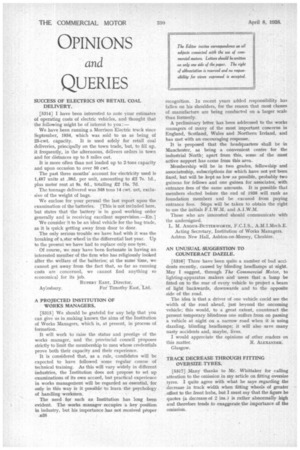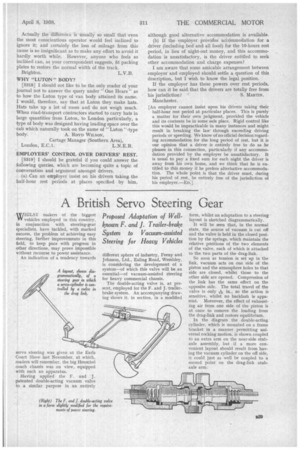OPINIONS
Page 72

Page 73

If you've noticed an error in this article please click here to report it so we can fix it.
and
QUERIES
SUCCESS OF ELECTRICS ON RETAIL COAL DELIVERY.
[5314] I have been interested to note your estimates of operating costs of electric vehicles, and thought that the following might be of interest to you :— We have been running a Morrison Electric truck since September, 1934, which was sold to us as being of 25-cwt. capacity. It is used solely for retail coal deliveries, principally on the town trade, but, to fill up, it frequently, in the afternoons, delivers orders in town and for distances up to 5 miles out.
It is more often than not loaded up to 2-tans capacity and upon occasion to over 50 cwt.
The past three months' account for electricity used is 1,487 units at .38d. per unit, amounting to 22 7s. ld., plus meter rent at 8s. 6d., totalling 22 15s. 7d.
The tonnage delivered was 348 tons 14 cwt. net, exclusive of the weight of bags.
We enclose for your perusal the last report upon the examination of the batteries. [This is not included here, but states that the battery is in good working order generally and is receiving excellent supervision.—En.] We consider it to be an ideal vehicle for the bag trade, as it is quick getting away from door to door.
The only serious trouble we have had with it was the breaking of a. star wheel in the differential last year. Up to the present we have had to replace only, one tyre.
Of course, we may have been fortunate in having an interested member of the firm who has religiously looked after the welfare of the batteries; at the same time, we cannot get away from the fact that, so far as running costs are concerned, we cannot find anything so economical for its job.
RUPERT East., Director,
Aylesbury. Fa Timothy East, Ltd.
A PROJECTED INSTITUTION OF WORKS MANAGERS.
[5315] We should be grateful for any help that you can give us in making known the aims of the Institution of Works Managers, which is, at present, in process of formation.
It will work to raise the status and prestige of the works manager, and the provincial council proposes strictly to limit the membership to men whose credentials prove both their capacity and their experience.
It is considered that, as a rule, candidates will be expected to have followed some regular course of technical training. As this will vary widely in different industries, the Institution does not propose to set up examinations of its own accord, but practical experience in works managerhent will be regarded as essential, for only in this way is it possible to learn the psychology of handling workmen.
The need for such an Institution has long been evident. The works manager occupies a key position in industry, but his importance has not received proper .538 recognition. In recent years added responsibility has fallen on his shoulders, for the reason that most classes of manufacture are being conducted on a larger scale than formerly.
A preliminary letter has been addressed to the works managers of many of the most important concerns in England, Scotland, Wales and Northern Ireland, and has met with an encouraging response.
It is proposed that the headquarters shall be in Manchester, as being a convenient centre for the industrial North; apart from this, some of the most active support has come from this area.
Membership will be in two grades, fellowship and associateship, subscriptions for which have not yet been fixed, but will be kept as low as possible, probably two guineas for fellows and one guinea for associates, with entrance fees of the same amounts. It is possible that members elected before the end of 1938 will rank as foundation members and be excused from paying entrance fees. Steps will be taken to obtain the right to use the initials F.I.W.M. and A.I.W.M.
Those who are interested should communicate with the undersigned.
L. M. ANGUS-BUTTERWORTH, F.C.I.S., A.M.I.Mech.E. Acting Secretary, Institution of Works Managers. Ashton New Hall, Ashton-on-Mersey, Cheshire.
AN UNUSUAL SUGGESTION TO COUNTERACT DAZZLE.
[5316] There have been quite a number of bad accidents recently, caused by blinding headlamps at night. May I suggest, through The Commercial Motor, to lighting-apparatus makers and users that a lamp be fitted on to the rear of every vehicle to project a beam of light backwards, downwards and to the opposite side of the road.
The idea is that a driver of one vehicle could see the width of the road ahead, just beyond the oncoming vehicle; this would, to a great extent, counteract the present temporary blindness one suffers from on passing a vehicle at night on a narrow road when it is using dazzling, blinding headlamps; it will also save many nasty accidents and, maybe, lives.
I would appreciate the opinions of other readers on this matter. R. ALEXANDER: Glasgow.
TRACK DECREASE THROUGH FITTING OVERSIZE TYRES.
[5317] Many thanks to Mr. Whittaker for calling attention to the omission in my article on fitting oversize tyres. I quite agree with what he says regarding the decrease in track width when fitting wheels of greater • offset to the front hubs, but I must say that the figure he quotes (a decrease of 2 ins.) is rather abnormally high and therefore tends to exaggerate the importance of the omission.
Actually be difference Es -usually so small that -even the most conscientious operator would feel inclined to ignore it; and certainly the loss of mileage from this cause is so insignificant as to Make any effort to avoid it hardly worth while. However, anyone who feels so inclined can, as your correspondent suggests, fit packing plates to restore the normal width of the track.
Brighton. L.V.B.
WHY "LUTON" BODY?
[5318] I should not like to be the only reader of your journal not to answer the query under "One Hears" as to how the Luton type of van body attained its name. I would, therefore, say that at Luton they make hats. Hats take up a lot of room and do not weigh much. When road-transport contractors started to carry hats in large quantities from Luton, to London particularly, a type of body was designed having loading space over the cab which naturally took on the name of " Luton "-type
body. A. Rom WILSON, Cartage Manager (Southern Area), London, E.C.1. ,L.N.E.R.
EMPLOYERS CONTROL OVER DRIVERS' REST. [5319] I should be grateful if you could answer the following queries, which are becoming quite a topic of conversation and argument amongst drivers.
(a) Can an employer insist on his drivers taking. the half-hour rest periods at places specified by him, although good alternative accommodation is available.
(b) If the employer provides accommodation for a driver (including bed-and all food) for the 10-hours rest period, in lieu of night-out money, and this accommodation is unsatisfactory, is the driver entitled to seek other accommodation and charge expenses?
I am aware that some amicable arrangement between employer and employed should settle a question of this description, but I wish to know the legal position.
If the employer has these powers over rest periods, how can it be said that the drivers are totally free from
his jurisdiction? . S. Marrnsr. Manchester.
[An employer cannot insist upon his drivers taking their half-hour rest period at particular places. This is purely a matter for their own judgment, provided the vehicle and its contents be in some safe place. Rigid control like this would be impracticable in many instances and might result in breaking the lawthrough exceeding driving periods or speeding. We know of no official decision regarding accommodation for the long period of rest, but it is our opinion that a driver is entirely free to do as he pleases in this connection, particularly if any accommodation provided by the employer be unsatisfactory. It is usual to pay a fixed sum for each night the driver is away from his own home, and we think that he is entitled to this money if he prefers alternative acconunodation. The whole point is that the driver must, during his period of rest,. be entirely free of the jurisdiction of his employer.—ED.]






















































































































